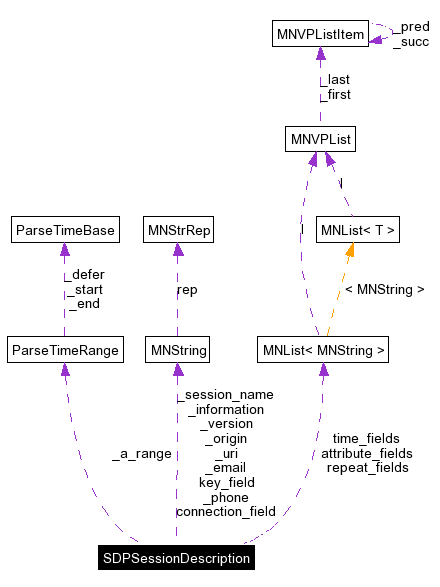
#include <SDPSessionDescription.h>
Collaboration diagram for SDPSessionDescription:

|
|
|
|
|
|
|
|
|
|
|
|
|
|
Several bandwidth fields can be added the session description. There should be only one application limit AS and one conference total limit CT, but the SDP RFC ignores this issue entirely, actually doesn't even talk about the possibility of multiple bandwidth fields in words. The grammar, however, allows it, and the interpretation makes sense. In the absence of an official interpretation, we care only about the first AS field (if present). Note (VK): in case of several subsessions, there may be several b=AS tags. |
|
|
|
|
||||||||||||
|
|
|
|
|
|
|
addBandwidth
|
|
|
|
|
|
Retrieve the entire connection line that applies with the "c="
|
|
|
Retrieve only the IP address from the connection line that applies.
|
|
|
|
|
|
|
|
|
|
|
|
|
|
|
Returns the connection field of the MC-stream if this sessiondescription has a patch attribute! By convention, that is the last media description in the session. returns 0 on success returns -1 on error |
|
|
|
|
|
|
|
|
|
|
|
|
|
|
|
|
|
|
|
||||||||||||
|
|
|
|
|
|
|
Basically, this function should be redundant because getARange exists. This function function should return exactly the same structure. However, we have made a mistake earlier in interpreting the t= tag as the duraction. This mean that we have to interpret the t= tag as the duraction in some cases. This function returns that wrong interpretation when the a=range: tag is not present.
|
|
|
|
|
|
|
|
|
|
|
|
|
|
|
|
|
|
|
|
|
addBandwidth
|
|
|
|
|
|
This function checks whether connection fields are present in the SDP message. Connection fields can be present at the session level or at the media level. The connection information at the media level overwrite those at the session level. In SDP they look like this in the most complicated case: c=IN IP4 224.2.1.1/127/3 IN indicates that this is the INET address family. IP4 means that these are IPv4 addresses. 224.2.1.1 is the first multicast address that is used. /127 is an optional fields that indicates that the TTL is 127. /3 is an optional fields (that we ignore so far in komssys) that indicates that address 224.2.1.2 and 224.2.1.3 are also used for the media.
|
|
|
|
|
|
|
|
|
|
|
|
|
|
|
|
|
|
|
|
|
|
|
|
|
|
|
|
|
|
|
|
|
|
|
|
|
|
|
|
|
|
|
|
|
|
|
|
|
|
|
|
|
|
|
|
|
|
|
|
|
|
|
|
|
|
|
|
|
|
|
|
|
|
||||||||||||
|
|
|
||||||||||||
|
|
|
|
|
|
|
|
|
|
|
|
|
Set the values of the a=range: attribute. The object that is handed in is not copied but swallowed. This is different from most other functions of this class.
|
|
|
|
 1.3.8
1.3.8